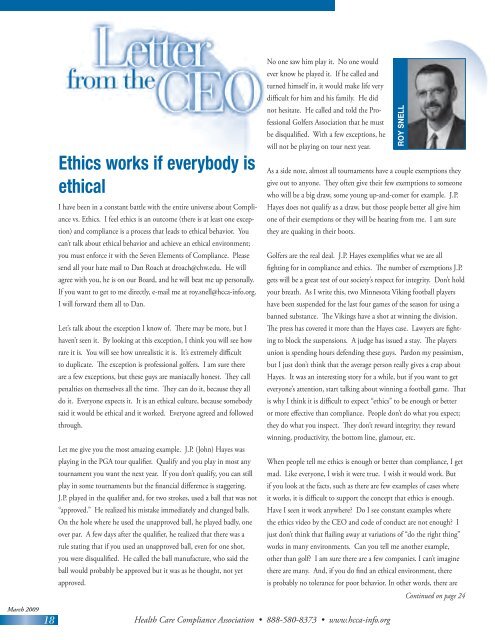BP - Health Care Compliance Association
BP - Health Care Compliance Association
BP - Health Care Compliance Association
You also want an ePaper? Increase the reach of your titles
YUMPU automatically turns print PDFs into web optimized ePapers that Google loves.
Ethics works if everybody is<br />
ethical<br />
I have been in a constant battle with the entire universe about <strong>Compliance</strong><br />
vs. Ethics. I feel ethics is an outcome (there is at least one exception)<br />
and compliance is a process that leads to ethical behavior. You<br />
can’t talk about ethical behavior and achieve an ethical environment;<br />
you must enforce it with the Seven Elements of <strong>Compliance</strong>. Please<br />
send all your hate mail to Dan Roach at droach@chw.edu. He will<br />
agree with you, he is on our Board, and he will beat me up personally.<br />
If you want to get to me directly, e-mail me at roy.snell@hcca-info.org.<br />
I will forward them all to Dan.<br />
Let’s talk about the exception I know of. There may be more, but I<br />
haven’t seen it. By looking at this exception, I think you will see how<br />
rare it is. You will see how unrealistic it is. It’s extremely difficult<br />
to duplicate. The exception is professional golfers. I am sure there<br />
are a few exceptions, but these guys are maniacally honest. They call<br />
penalties on themselves all the time. They can do it, because they all<br />
do it. Everyone expects it. It is an ethical culture, because somebody<br />
said it would be ethical and it worked. Everyone agreed and followed<br />
through.<br />
Let me give you the most amazing example. J.P. (John) Hayes was<br />
playing in the PGA tour qualifier. Qualify and you play in most any<br />
tournament you want the next year. If you don’t qualify, you can still<br />
play in some tournaments but the financial difference is staggering.<br />
J.P. played in the qualifier and, for two strokes, used a ball that was not<br />
“approved.” He realized his mistake immediately and changed balls.<br />
On the hole where he used the unapproved ball, he played badly, one<br />
over par. A few days after the qualifier, he realized that there was a<br />
rule stating that if you used an unapproved ball, even for one shot,<br />
you were disqualified. He called the ball manufacture, who said the<br />
ball would probably be approved but it was as he thought, not yet<br />
approved.<br />
No one saw him play it. No one would<br />
ever know he played it. If he called and<br />
turned himself in, it would make life very<br />
difficult for him and his family. He did<br />
not hesitate. He called and told the Professional<br />
Golfers <strong>Association</strong> that he must<br />
be disqualified. With a few exceptions, he<br />
will not be playing on tour next year.<br />
ROY sNELL<br />
As a side note, almost all tournaments have a couple exemptions they<br />
give out to anyone. They often give their few exemptions to someone<br />
who will be a big draw, some young up-and-comer for example. J.P.<br />
Hayes does not qualify as a draw, but those people better all give him<br />
one of their exemptions or they will be hearing from me. I am sure<br />
they are quaking in their boots.<br />
Golfers are the real deal. J.P. Hayes exemplifies what we are all<br />
fighting for in compliance and ethics. The number of exemptions J.P.<br />
gets will be a great test of our society’s respect for integrity. Don’t hold<br />
your breath. As I write this, two Minnesota Viking football players<br />
have been suspended for the last four games of the season for using a<br />
banned substance. The Vikings have a shot at winning the division.<br />
The press has covered it more than the Hayes case. Lawyers are fighting<br />
to block the suspensions. A judge has issued a stay. The players<br />
union is spending hours defending these guys. Pardon my pessimism,<br />
but I just don’t think that the average person really gives a crap about<br />
Hayes. It was an interesting story for a while, but if you want to get<br />
everyone’s attention, start talking about winning a football game. That<br />
is why I think it is difficult to expect “ethics” to be enough or better<br />
or more effective than compliance. People don’t do what you expect;<br />
they do what you inspect. They don’t reward integrity; they reward<br />
winning, productivity, the bottom line, glamour, etc.<br />
When people tell me ethics is enough or better than compliance, I get<br />
mad. Like everyone, I wish it were true. I wish it would work. But<br />
if you look at the facts, such as there are few examples of cases where<br />
it works, it is difficult to support the concept that ethics is enough.<br />
Have I seen it work anywhere? Do I see constant examples where<br />
the ethics video by the CEO and code of conduct are not enough? I<br />
just don’t think that flailing away at variations of “do the right thing”<br />
works in many environments. Can you tell me another example,<br />
other than golf? I am sure there are a few companies. I can’t imagine<br />
there are many. And, if you do find an ethical environment, there<br />
is probably no tolerance for poor behavior. In other words, there are<br />
Continued on page 24<br />
March 2009<br />
18<br />
<strong>Health</strong> <strong>Care</strong> <strong>Compliance</strong> <strong>Association</strong> • 888-580-8373 • www.hcca-info.org

















